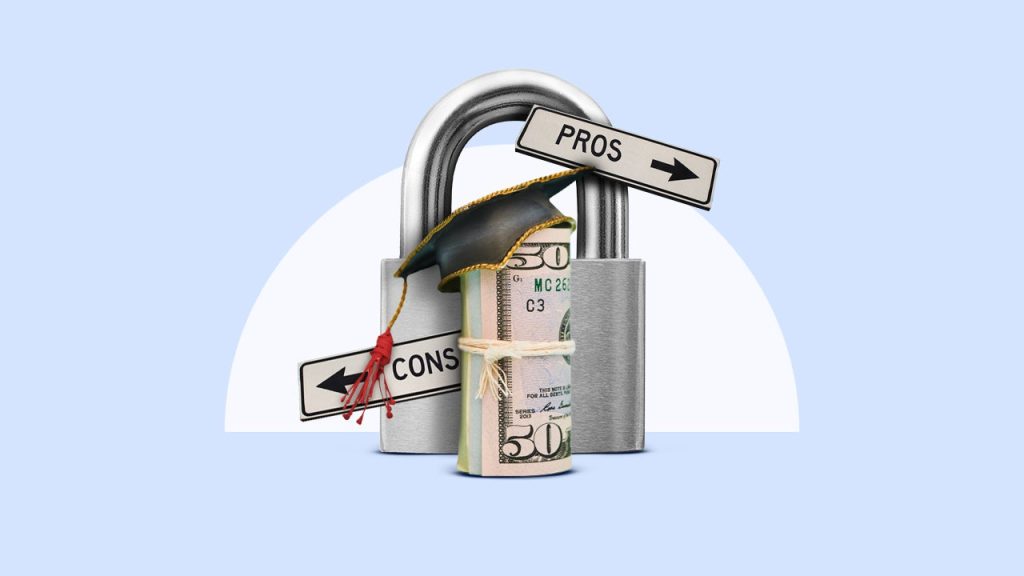Key takeaways
- Private student loans may offer higher borrowing limits and potentially lower interest rates compared to federal loans.
- Private student loans may also be tax deductible, but they can carry the risk of not being discharged in bankruptcy and potentially persisting after death.
- Private student loans do not offer the same benefits as federal loans, such as income-driven repayment plans and loan forgiveness options.
- The application process for private student loans is typically faster, but it’s important to carefully consider the terms and potential risks before borrowing.
Private student loans come with higher loan limits and — sometimes — lower borrowing costs compared to their federal counterparts. However, private student loans also have limitations. For example, you won’t get access to income-driven repayment plans, loan forgiveness options (if you’re eligible) and the other benefits that come with federal loans. You could also spend more than you anticipated in interest if you have a lower credit score.
Pros of student loans
Private student loans can help bridge the gap when federal aid falls short, allowing you to borrow up to your school’s cost of attendance and often providing competitive rates if you have good credit.
Can be cheaper than federal loans
If you’re an undergraduate student, you likely won’t find anything cheaper than a federal student loan, especially if you haven’t had the chance to build a credit history. The Department of Education’s graduate and parent student loans are pricier than its undergraduate loans.
If you or your cosigner have a solid income and a high credit score, a private student loan may offer you a better interest rate with no upfront fee. The annual percentage rate (APR) for private student loans can vary significantly based on the lender and terms. However, the best private student loans start at under 4 percent. Depending on the situation, it’s good to compare what you might qualify for with private lenders and what the federal government offers.
Higher borrowing limits
If you’re attending an expensive school, you may not get the amount you need if you only go through the federal government for student loans. For instance, if you’re an undergraduate student, you can borrow between $5,500 and $12,500 per year, depending on your year in school and dependency status. The lifetime maximum is $31,000 for dependent students and $57,500 for independent students.
With private loans, however, you can typically borrow up to the total cost of attendance, minus any financial aid received, every year. It gives you far more flexibility to get the financing you need.
Garrett Roach used private loans to pay for his master’s degree in structural engineering at the South Dakota School of Mines and Technology. “When I was applying to grad school, the amount of federal loans I could receive was greatly limited,” he says. “I may have borrowed more than I would have with a federal student loan, but it helped me cover my immediate tuition needs while enrolled in school. My private loan allowed me to afford grad school and continue my education.”
Fast application process
You must file the Free Application for Federal Student Aid (FAFSA) to access federal student loans. It typically takes up to an hour to complete and three to five days to process if you submit it online. The processing time for paper applications is seven to 10 business days.
By contrast, most private lenders feature a much more streamlined application process. You can generally apply online, upload requested income documentation and get approved and funded within just a few business days.
However, even if you plan to exclusively use private student loans, you should still file the FAFSA — it’s the best way to find out if you’re eligible for work-study, grants and other financial aid at your college.
Open to those who don’t qualify for federal student loans
Borrowers not eligible for federal student loans may find they qualify for private student loans. This includes students who do not demonstrate financial need and aren’t enrolled at least half-time. It also includes non-citizens without a green card but with a cosigner who is a U.S. citizen, as well as those who have exceeded the maximum federal borrowing limit.
Private student loan requirements are different; the lender typically considers your finances and credit score, so they may be an especially helpful option if you do not qualify for other types of financial aid.
Potentially tax deductible
Both federal and private loan interest can be tax-deductible for students enrolled at least half-time. For private loans, up to $2,500 in interest each year may be tax deductible on your return. Lenders will issue a form 1098-E indicating how much interest you’ve paid over the previous year. Consult the IRS website or a tax professional for details.
Unique perks
In addition to your loan, you may be able to benefit from other perks from your private lender. This can include an interest rate discount for signing up for automatic payments or a longer grace period after graduation. Many lenders, including College Ave, have monthly scholarship giveaways, and some, like Custom Choice, promise a small principal discount once you successfully graduate.
Cons of private student loans
Private student loans can present some potential issues for borrowers, such as limited repayment plans, ineligibility for federal forgiveness programs and fewer relief options during financial hardship. More than that, they also typically require a good credit score or a cosigner.
No access to income-driven repayment or forgiveness
Federal loans offer income-driven repayment plans that reduce payments based on borrowers’ income, making them a great option for borrowers struggling to meet high monthly payments. Most private lenders don’t extend that same generosity; the only way to lower monthly payments is through refinancing your student loans to a lower interest rate or longer repayment term.
Also, if you work as a teacher or in some other form of public service, you may qualify to have some or all of your federal loans forgiven through Public Service Loan Frogiveness after you meet certain criteria. Private lenders don’t have that option, nor would they be included in any executive action canceling student debt.
Interest rates are based on creditworthiness
In some cases, you can qualify for lower interest rates with private lenders than the federal government offers. However, private lenders offer a range of rates, and unless your income and credit score are stellar, you may end up with a much higher rate than you want. Many private lenders allow you to apply with a cosigner, such as a parent, which can improve your chances of getting favorable terms.
It’s also important to note that the lowest private student loan interest rates are generally variable, fluctuating over time with market conditions. If you get a variable-rate loan, your monthly payment could increase.
There’s no federal subsidy
Undergraduate students with financial needs may qualify for subsidized federal student loans. With these loans, the federal government pays your interest while you’re in school, as well as during future deferment periods. With private loans, though, there is no subsidy, so you’re on the hook for all the interest that accrues on your debt.
Usually cannot be discharged in bankruptcy
Private student loans generally cannot be discharged when a borrower files for bankruptcy. Due to an overhaul of the bankruptcy code in 1978, borrowers must now prove that their student loan payments cause “undue hardship” and prevent them from a minimum standard of living before the courts consider discharging this type of loan.
Deferment and forbearance are more limited
Though these options are standard for most federal student loans, deferment and forbearance options are not guaranteed with private student loans. The availability of these payment pauses may depend on your lender’s unique terms.
Risks of overborrowing
You could access a private student loan equivalent to your total cost of attendance, minus other financial aid you’ve received. The higher loan amount gives you more cushion to cover your higher education expenses, but you risk borrowing more than you need. Plus, you could get stuck with steep monthly loan payments, including hefty interest that accrues over time.
Debt may persist after death
Your federal student loans are discharged when you die, which means your estate isn’t on the hook for outstanding balances. This isn’t always the case with private student loans, though. Most lenders write the debt off, but some may try to recoup what they’re owed from your estate. If the claims are successful, the inheritance left to your loved ones could be negatively impacted.
Private student loans vs. federal student loans
Different private student loans allow you to finance your education through a private lender with varying repayment terms and interest rates. By comparison, federal student loans are issued by the Department of Education and come with standard benefits and fixed rates.
In most cases, college students should turn to federal student loans first if they need help financing their education after free money options have been exhausted. Federal loans give you access to income-driven repayment plans and loan forgiveness programs. These loans usually don’t require a credit check for most loans, and everyone who qualifies gets the same interest rate.
With that said, most federal loans limit how much you can borrow each year and in total. Borrowers with excellent credit could find lower interest rates with private loans.
Bottom line
When deciding which type of loan to get, be sure to weigh both federal and private student loans pros and cons. Private student loans can be a valuable resource for financing your education if you have exhausted other forms of free funding. They can offer higher loan limits and, in some cases, lower borrowing costs. These types of features could make them a good fit for you, depending on your financial situation.
However, it’s important to note that private student loans also lack the benefits of federal loans, such as access to income-driven repayment plans and loan forgiveness options. They could also cost more in interest for those with lower credit scores. So, when choosing a private student loan, one should carefully weigh the pros and cons they offer. Be sure to carefully evaluate your financial situation and compare options from different lenders. After all, it makes sense to be mindful of your borrowing and always strive to minimize your student debt.
Frequently asked questions
Read the full article here










